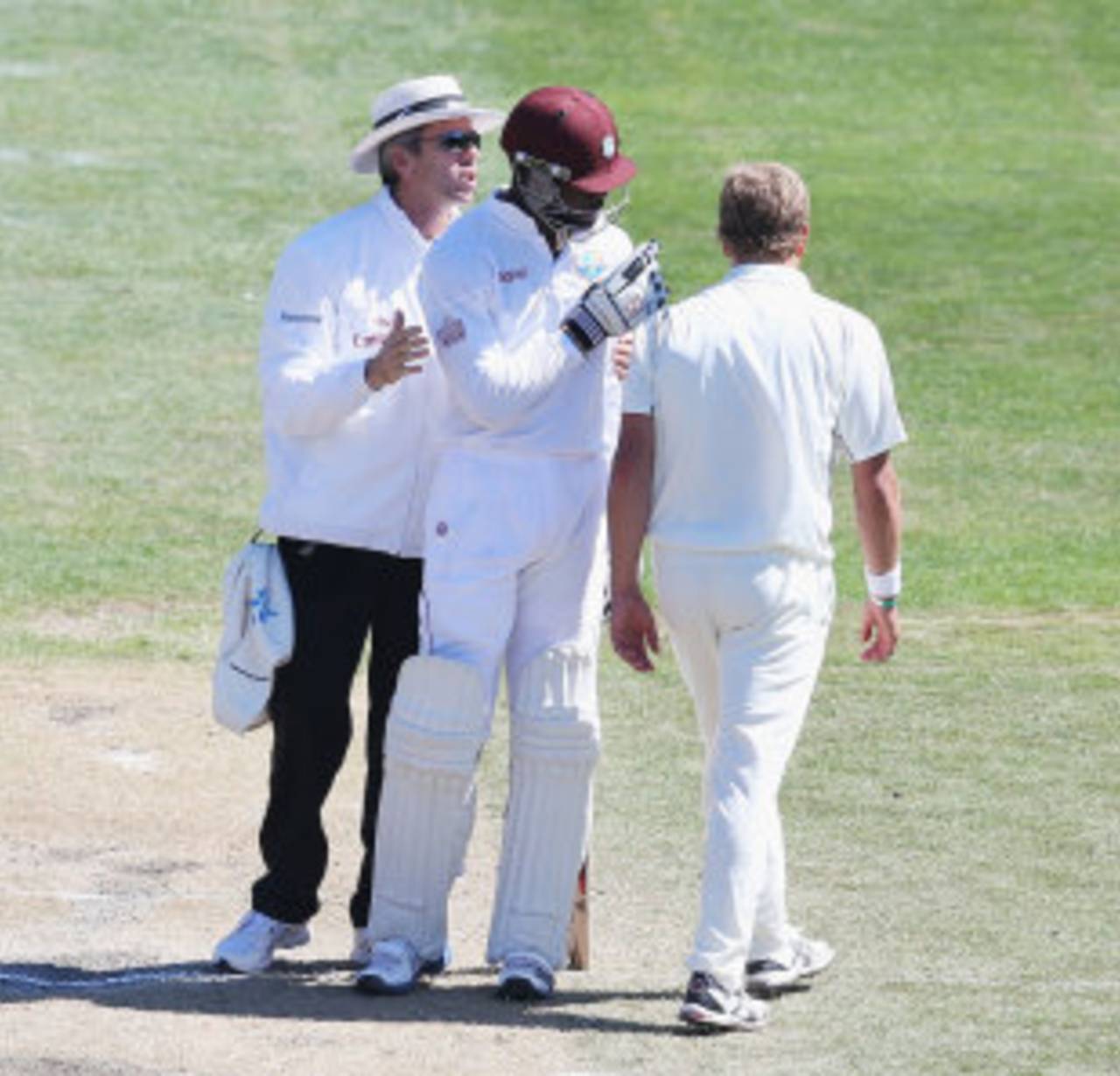At Dunedin (University Oval), December 3-7, 2013. Drawn. Toss: West Indies.
Eight months after being denied by England's last-wicket pair at Auckland, New Zealand again left with a draw when victory had appeared certain. This time weather played a part, curtailing their unconvincing run-chase five minutes before tea on the final day. However, West Indies showed incredible resolve after following on midway through the match. Having spent more than eight hours in the field watching Taylor compile his maiden double-hundred, Darren Bravo spent nine and a half making one of his own: his 218 was the second-highest score by a West Indian in New Zealand, behind Seymour Nurse's 258 at Christchurch in 1968-69.
When play was finally abandoned at 6.10, with New Zealand 33 short of victory and six wickets in hand, McCullum's expression was as drawn as the match itself. Exactly a year on from his appointment as captain following the sacking of Taylor, he was still awaiting his first victory. McCullum did score his first Test hundred for three years on the opening day, but that didn't make the result any less galling.
Sammy had bowled first on a well-grassed pitch, but West Indies were woeful with the new ball, allowing Rutherford - with his first Test fifty since his 171 on debut against England earlier in the year - and Fulton to canter to 95. The platform was not wasted, although Best came within inches of nabbing Taylor when he gloved over slip on two. Taylor and McCullum joined forces in a free-wheeling fourth-wicket partnership eventually worth 195 in 43 overs. There was a regular supply of loose balls, but it was a hugely significant performance by two players under such scrutiny: McCullum said he had "never played under so much media and public pressure". Taylor, without a hundred since his final match as captain in Colombo more than a year earlier, had also been in need of a big innings. As he resisted his trademark slog-sweep, and rarely hit in the air, he exuded self-denial.
McCullum was first to three figures, from 101 balls, then Taylor reached his, in 150; the new captain's celebrations were more exuberant than his predecessor's. McCullum finally fell early on the second day, but West Indies were hampered when Sammy strained a glute muscle in his 24th over and could not bowl again in the match. Taylor was dropped at short leg when 131, but largely went about his business as he pleased to get to 200 from 295 balls. It was his country's 17th Test double-century, and the first since McCullum's 225 in India in November 2010. New Zealand reached 600 for the fourth time in Tests - and for the fourth time they would be denied victory.
West Indies' reply began predictably badly against probing new-ball spells from Boult and Southee. Both openers were gone within ten overs and, on the third day of a series which would prove full of flat-footed wafts, there were regular catches for the cordon. As so often, only Chanderpaul showed the ability to resist, rattling up 76 off 87 balls, but Boult eventually trapped him too, lbw offering no stroke. McCullum was soon enforcing the follow-on, a no-brainer with a lead of 396, although it did risk a long spell in the field.
Wickets proved harder to come by second time round, but New Zealand chipped away efficiently at first. When Samuels and Chanderpaul departed early on the fourth morning, leaving West Indies 185 for four and still more than 200 adrift, bags were being packed and airline schedules checked.
But Bravo was going nowhere. His overseas record was already formidable: all his previous five Test hundreds had come away from home, and he finished this match averaging 57 overseas, against just under 30 in the Caribbean. Still, this was a display few believed possible from any West Indian apart from Chanderpaul. Bravo had some luck. On 44 he fended a bouncer from Wagner to first slip, and New Zealand reviewed the original not-out decision. Replays appeared to show a touch on the glove, but the third umpire, Ian Gould, thought otherwise. Then, when Bravo had 82, Wagner
spilled a return catch. At the time these appeared to be no more than annoyances for New Zealand.
But over by over, hour by hour, session by session, Bravo ploughed on. His 200 came up late on the fourth day, from 390 balls. References to his famous cousin were never far away, not least from Sammy: "Even the great Lara would have been proud of that innings." Bravo and Sammy added 90 for the seventh wicket to take West Indies into the lead, but Bravo was finally defeated by a grubber from Boult early on the final morning, after 572
minutes, 416 balls and 31 fours. Sammy was left to edge the advantage into three figures as the sky began to fill in.
New Zealand needed only 112, but began like a team unused to winning. Shillingford, handed the new ball thanks to Sammy's injury and Gabriel's profligacy, preyed on their nerves. When McCullum skied a slog-sweep it was 44 for four, and there were whispers of a comeback bordering on Kolkata 2000-01. Taylor and Anderson kept calm, but the early wickets had curbed their attacking instincts. This would prove crucial: when the rain
came, it wouldn't stop. After so much hard work, New Zealand were left cursing the win that got away.
Man of the Match: L. R. P. L. Taylor.

